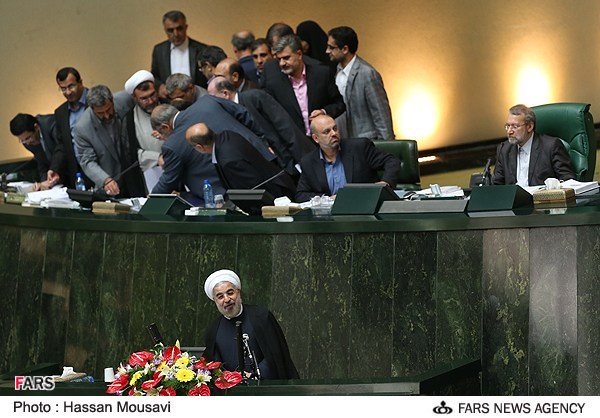LATEST: “Publishers Determined to Break Censorship”
President Rouhani will present his 18-member Cabinet to Parliament on Monday, seeking quick approval of the choices.
The proposed Cabinet is marked by the presence of officials who were prominent in the Rafsanjani and Khatami administrations before they were sidelined by Rouhani’s predecessor, Mahmoud Ahmadinejad. Among the nominees are Foreign Minister Mohammad Reza Zarif, former Iranian Ambassador to the United Nations; Oil Minister Bijan Namdar-Zanganeh, who held the post from 1997 to 2005; Economy Minister Ali Tayebnia, an academic; and Industry Minister Mohammad Reza Nematzadeh, a leading figure in Rouhani’s Presidential campaign.
As soon as he was elected, Rouhani sought a co-operative relationship with Parliament, meeting the Speaker Ali Larijani on his day after his victory. However, some hard-liners in the Majlis have threatened to block nominees on the grounds that they have connections with the 2009 “sedition”, the mass protests after the disputed Presidential election.
Latest Updates, From Top to Bottom
“Publishers Determined to Break Censorship”
An EA correspondent reports from contacts in Iran:
Most banned publishers continue to work. Some just changed name. Publishers determined to break censorship.
Most readings now in private. Some authors publish without permit, distribute books via friendly bookstores. Intellectuals determined to continue [their projects].
Rouhani Presents Cabinet of “Moderation” to Address Immediate Problems
President Rouhani, presenting his Cabinet to Parliament, has framed consideration of them as a referendum on his proposed Government: “[This] is not just an endorsement of a single person as the president but a vote for the proposed plans and the choice of cabinet members.”
Rouhani suggested urgency, amid internal difficulties and sanctions, “The country is currently in a sensitive economic and social situation which is exacerbated by the international pressures.”
Referring specifically to the US-led sanctions, the President said, “The issue is not whether sanctions have been effective or not; the question is whether the method chosen by the Western countries is a correct or suitable approach to resolve an international issue.”
He continued by renewing themes from his campaign, “People are fed up with extremism and are welcoming moderation….[We can] address the collective demands of the people in a reasonable time with the cooperation of all the positive forces in the country.”
And, directly appealing to the legislators, he said, “An informed, dynamic, and persistent Majlis can guarantee the wellbeing and success of the executive branch.”
Iran’s Former Ambassador To France Slams London’s “Hasty Move” To Cut Ties With Tehran, Encourages Restoring Links
Sadeq Kharrazi, Iran’s former envoy to France, told Fars News on Sunday that the British government acted “in haste” when it cut diplomatic ties with Tehran in November 2011, in the wake of a violent protest outside the British Embassy in Tehran.
Kharrazi called on London to “seize the opportunity” of Hassan Rouhani’s Presidency to restore ties with Tehran.
The former ambassador also said that the U.S. and Canada could also move to restore bilateral relations with Tehran.
Following Rouhani’s election in June, Kharrazi spoke of a “window of opportunity” for both Iran and West to “resolve outstanding issues”.
In a piece for his Iranian Diplomacy website, Kharrazi wrote: “Certainly there are voices on both sides that oppose any rapprochement. On one side there is a strong Israeli lobby as well as neo-conservatives and hardliners in the US and Europe which call for more sanctions and possible military action against Iran. On the other side, there are people inside Iran who advocate more resistance against the West in the hope that it will finally give in to Iran’s demands.”

